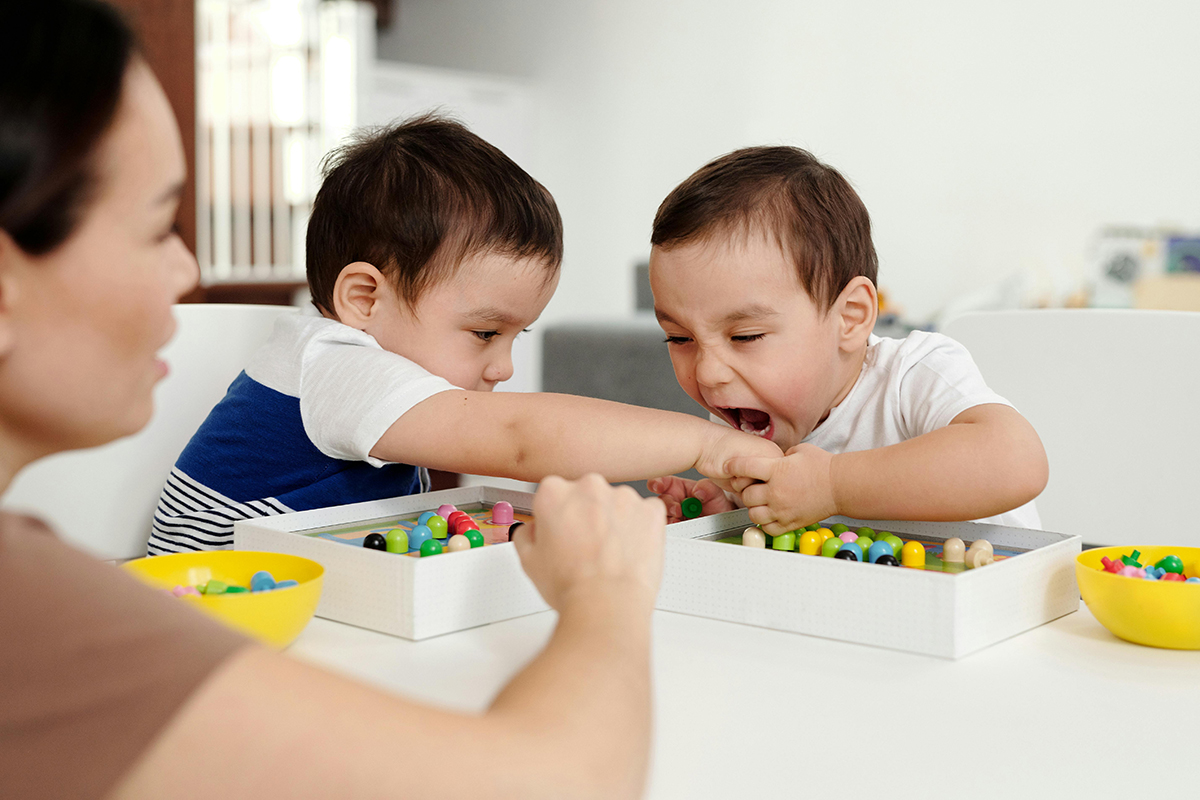Our typically very sweet-natured 18-month-old daughter casually bites us to put emphasis on her wishes. We also had to sign the “biting book” at her nursery twice already. I am a bit lost about how to deal with this. She seems too young to understand the point of time-outs or withdrawal of privileges. I’ve read that you’re not supposed to make a fuss and give attention to bad behavior, but surely we can’t just ignore it either. She now speaks putting two words together, so it is not that she cannot express what she wants. I really wonder why this is her method of choice to get our attention.
—Anonymous
I am going to try to help, but I cannot get the idea of the biting book out of my head. I feel for you. Let’s try to work through it.
The options here seem to me to be on a continuum: (a) basically do nothing and hope it passes; (b) adopt some in-home discipline system to try to curb the behavior; or (c) escalate to more extreme evaluation or family therapy.
By outlining it this way, we can pinpoint a little bit the information we need to make a decision. In particular: to differentiate between (c) and the other two, you probably want to understand how typical this is. And to evaluate whether you want to do (b) relative to (a), you probably want to understand what the “best practice” intervention would be, and whether it would work.
In a sense, we know this behavior must be typical, because there is a biting book, but it may be useful to see some numbers.
This older paper reports on biting in child care centers. It looks at two other studies on the frequency of biting. In one sample of 224 children, 104 of them were bitten a total of 347 times in a year. In a second sample, 66 of 133 children were bitten a total of 224 times over a three-year period. Toddlers (as with your child) are the biggest biting risk. Biting in child care is more common in September (when care starts) and can sometimes be addressed by changing up the structure of the room.
Suffice it to say, this behavior is common, and unless I’m missing something from this letter, your child’s behavior is fairly normal. It doesn’t mean you do not want to address it!
Given the frequency of biting as an aggressive impulse, one might think we have a good solution. However, there is no magic bullet. Toddler aggression — biting, hitting, and more — is a normal developmental stage. Toddlers do this out of anger and frustration. Yes, being able to talk helps, but you cannot express all your feelings in two-word phrases, and she probably can’t either.
One solution is to try to limit situations that seem to prompt biting, or to redirect your daughter when she seems to be getting frustrated. This may work some of the time, although it will not eliminate all incidents.
There is a lot of back-and-forth on issues of consequences (time-outs etc., which your child is not likely to be old enough for anyway). But there is broad agreement on the idea of consistency. If you are going to adopt some response, it should be the same one every time. For a small kid, that response should involve a version of taking them out of the situation, telling them in simple words not to do the behavior, and not giving them attention in response.
I found this document broadly helpful for framing some options. But whatever version you decide on, again, you, your partner, and ideally other caregivers should do it every time. Kids act out for attention, out of frustration, but also to test what happens. If a new thing happens every time, it is kind of interesting. Don’t make it interesting!
This is the best “evidence-based” approach (and yes, there is evidence on behavior programs like these). If you are going to do something concrete, a version of this is the right approach. In contrast, there are some things you should not do. The main one is not to meet aggression with aggression. No physical punishment, no biting back, no spanking. That isn’t the way to better behavior.
Follow-up is important here. If you change what you’re doing, you’ll want to pay attention to whether it is working. Not, like, the next day, but over a couple of weeks you’d hope to see some positive changes. Make a plan to do a little tracking, and a plan for revisiting in a short while. If you do not change what you’re doing, it likely makes sense to plan a time to revisit that choice. Kids’ needs change as they age, and even if you want to let it ride for now, you might feel differently in three months.
Community Guidelines


















Log in